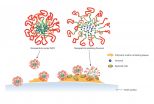(Press-News.org) Jacksonville, Fla. (April 1, 2015) - Training pediatric primary care providers to screen and assess depression and suicide risk in adolescent patients improved providers' confidence and knowledge of these conditions and increased frequency of screenings for this critical patient population. The study, published in the May/June issue of Academic Pediatrics, demonstrates an effective tool for improving recognition of adolescent depression.
"Adolescent depression is woefully underrecognized and undertreated," said Elise Fallucco, MD, a lead author of the study and child and adolescent psychiatrist at Nemours Children's Specialty Care in Jacksonville, Fla. "Pediatric primary care providers are well-positioned help identify early signs of depression, but most do not have the tools or training to do so reliably."
Because only 50 percent of adolescent depression cases are identified and only 38 percent of diagnosed patients receive treatment, professional guidelines by the American Academy of Pediatrics and the United States Preventive Task Force both recommend primary care screening of the condition. These providers evaluate 70 percent of adolescents annually, including 45 percent of suicide victims within the month before they complete suicide.
Researchers recruited 31 pediatric primary care providers from four practices to increase screening and identification of adolescent depression and improve providers' confidence and knowledge of adolescent depression. In total, providers had been in practice for an average of 16 years, but reported only an average of 2.9 weeks of prior mental health training including during residency. Each provider participated in baseline assessments, training and short and long-term follow-up measured by patient surveys. The trainings included strategies for screening, assessment, and treatment for depression with an antidepressant medication and practice sessions with actors portraying adolescent patients.
Approximately 1,200 patients participated in the study. Each was provided a standardized tool to help providers screen their risk, as well as took a follow-up survey to evaluate if the provider screened or diagnosed depression and discussed treatment options.
As a result of the training, provider screening for depression increased and confidence and knowledge improved. In the duration of the long-term follow-up at 18 to 24 months post-training, 74 percent of patients reported that they had been verbally screened by their provider and 95 percent reported that they had completed a self-assessment prior to their visit. Providers' confidence and knowledge of adolescent depression was maintained more than four to six months following the initial training. The findings suggest that the tools had been integrated into regular well-child visits.
"Skills in assessing and managing depression will be increasingly necessary for primary care providers," said Fallucco. "Our simple intervention empowered providers to promote early identification and treatment of adolescent depression by equipping them with the tools and knowledge needed to deliver this care."
INFORMATION:
Nemours is an internationally recognized children's health system that owns and operates Nemours Children's Specialty Care in Jacksonville, Florida, as well as the Alfred I. duPont Hospital for Children in Wilmington, Delaware, Nemours Children's Hospital in Orlando, Florida along with pediatric specialty clinics in Delaware, Florida, Pennsylvania and New Jersey.
Established as The Nemours Foundation through the legacy and philanthropy of Alfred I. du Pont, Nemours offers pediatric clinical care, research, education, advocacy and prevention programs to all families in the communities it serves. For more information, visit http://www.Nemours.org
The name sounds like something Marvin the Martian might have built, but the "nanomechanical plasmonic phase modulator" is not a doomsday device. Developed by a team of government and university researchers, including physicists from the National Institute of Standards and Technology (NIST), the innovation harnesses tiny electron waves called plasmons. It's a step towards enabling computers to process information hundreds of times faster than today's machines.
Computers currently shuttle information around using electricity traveling down nanoscale metal wires. Although ...
Annapolis, Md -- New research published today in Nature Communications provides insight into how large-scale deforestation could impact global food production by triggering changes in local climate. In the study, researchers from the United States and China zero in on albedo (the amount of the sun's radiation reflected from Earth's surface) and evapotranspiration (the transport of water into the atmosphere from soil, vegetation, and other surfaces) as the primary drivers of changes in local temperature.
The research is the first global analysis of the effects of forest ...
If you want the benefits of medical marijuana without the "unwanted side effects" of cannabis, new research should leave you on a high note. According to a research report appearing in the April 2015 issue of The FASEB Journal, fenofibrate, also known by the brand name Tricor®, may benefit a wide range of health issues, such as pain, appetite stimulation, nausea, as well as immune and various psychiatric and neurological conditions. This suggests that fenofibrate may be the starting point for a new class of cannabis-like drugs to treat these types of conditions.
"By ...
The Pacific Northwest is dotted by small, low-lying, coastal cities where populations tend to cluster. These communities can be isolated and are susceptible to devastation from major storms that bring substantial wind, waves and storm surge. With climate change, it is anticipated that storms will only become more frequent and intense, signifying a need to understand how the areas will be affected.
David Hill, a researcher at Oregon State University, is focused on the hydrology and hydrodynamics in coastal areas, which represent the boundary between terrestrial and marine ...
PHILADELPHIA-- Penn Medicine researchers are continuing their work in trying to understand the mechanisms through which anesthetics work to elicit the response that puts millions of Americans to sleep for surgeries each day. Their most recent study looked at ketamine, an anesthetic discovered in the 1960s and more recently prescribed as an anti-depressant at low doses. Through collaboration with the University of Pennsylvania's department of Chemistry and scientists at the Duke University Medical Center, researchers at Penn's Perelman School of Medicine have identified ...
ALEXANDRIA, VA -- An updated clinical practice guideline from the American Academy of Otolaryngology--Head and Neck Surgery Foundation published today in Otolaryngology-Head and Neck Surgery identifies quality improvement opportunities and explicit actionable recommendations for clinicians managing adult sinusitis, including a greater focus on patient education and patient preference.
"More than ever before, there is a prominent role for shared decision-making between patients and clinicians when managing adult sinusitis--especially in deciding whether to use antibiotics ...
In 2006 construction began on a new shopping centre in Tulln. The works unearthed various archaeologically valuable objects that were salvaged during rescue excavations. Among these objects was also the complete skeleton of a large mammal.
Large mammal uncovered during excavations in Tulln
"The partly excavated skeleton was at first suspected to be a large horse or cattle," says archaeozoologist Alfred Galik from the Institute for Anatomy, Histology and Embryology at the University of Veterinary Medicine Vienna. "But one look at the cervical vertebrae, the lower jaw ...
Therapeutic agents intended to reduce dental plaque and prevent tooth decay are often removed by saliva and the act of swallowing before they can take effect. But a team of researchers has developed a way to keep the drugs from being washed away.
Dental plaque is made up of bacteria enmeshed in a sticky matrix of polymers--a polymeric matrix--that is firmly attached to teeth. The researchers, led by Danielle Benoit at the University of Rochester and Hyun Koo at the University of Pennsylvania's School of Dental Medicine, found a new way to deliver an antibacterial agent ...
People who apply eyeliner on the inner eyelid run the risk of contaminating the eye and causing vision trouble, according to research by a scientist at the University of Waterloo. This is the first study to prove that particles from pencil eyeliner move into the eye.
Dr. Alison Ng, at the Centre for Contact Lens Research at Waterloo, directed the study when she was at Cardiff University in Wales. The team's findings appear in Eye and Contact Lens Science and Clinical Practice, the official peer-reviewed journal of the Contact Lens Association of Ophthalmologists.
Dr. ...
If you are trying to have a baby, a good night's sleep is more important than ever. A new research report appearing in The FASEB Journal shows that the womb has its own "body clock" that needs to synchronize with the mother's body clock to ensure optimal conditions for fetal growth and development. The inability of a mother's body clock to synchronize with the womb's clock may be at least part of the reason why some women have difficulty carrying a pregnancy to full term. Specifically, the failed synchronization switches off body clock genes in cells lining the womb, which ...




